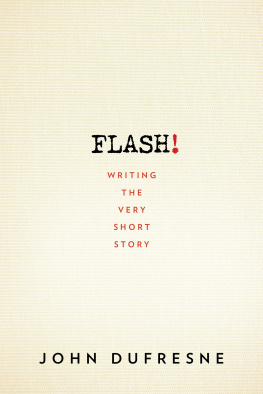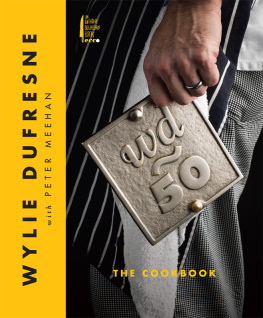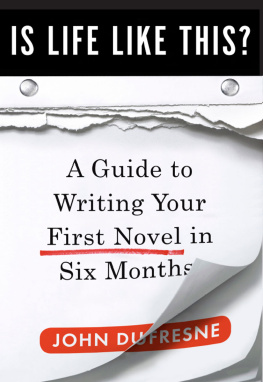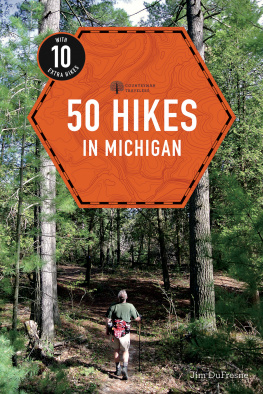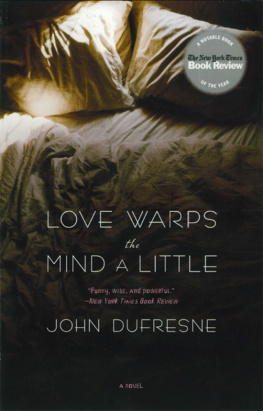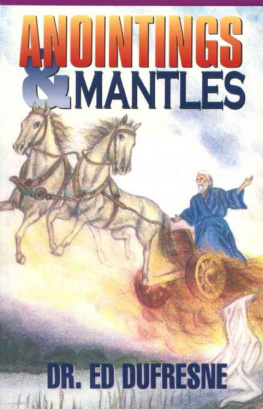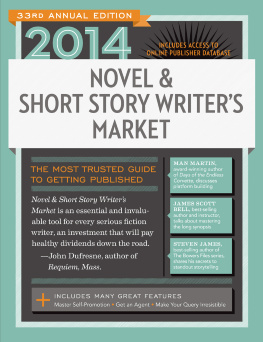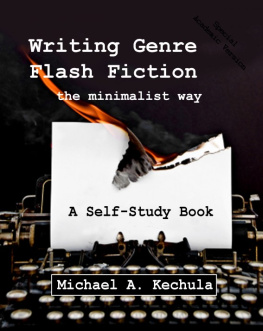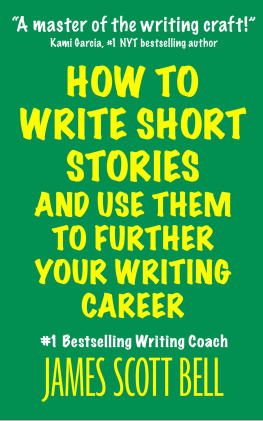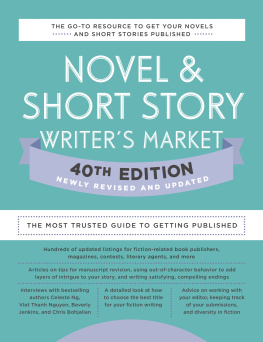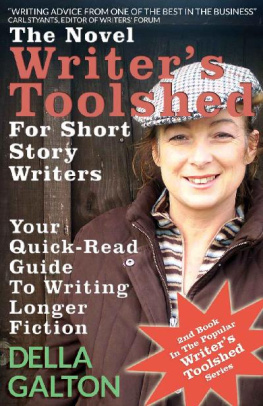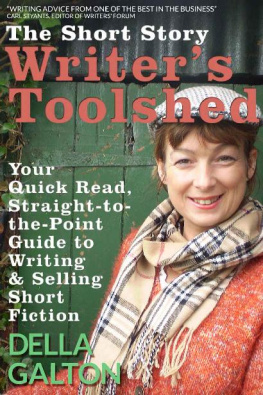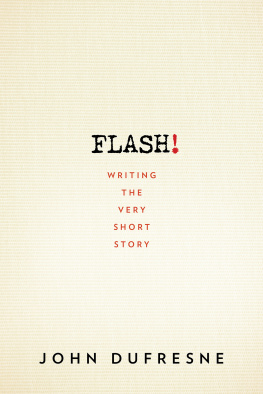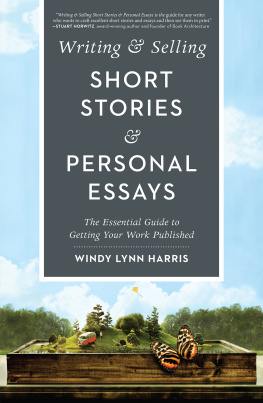
FLASH !
WRITING THE VERY SHORT STORY
John Dufresne

W. W. NORTON & COMPANY
Independent Publishers Since 1923
NEW YORK | LONDON
For Lefty and Dot And always for Cindy
L ORD CHESTERFIELD called the novel a kind of abbreviation of a Romance. Ian McEwan described the more compact novella as the beautiful daughter of a rambling, bloated, ill shaven giant. William Trevor considered the short story essential art. Writing a story, he said, is infinitely harder than writing a novel, but its infinitely more worthwhile. And now we have the even shorter story, a form that was validated, if it needed to be, when Lydia Davis, whose stories are sometimes a sentence long, was awarded the 2013 Man Booker International Prize. In their citation, the judges said of Daviss works: Just how to categorize them? They have been called stories but could equally be miniatures, anecdotes, essays, jokes, parables, fables, texts, aphorisms or even apothegms, prayers or simply observations.
The short-short story is narrative (or its not) that is distilled and refined, concentrated, layered, coherent, textured, stimulating, and resonant, and it may prove to be the ideal form of fiction for the twenty-first century, an age of shrinking attention spans and busy and distracted lives, in which our mobile devices connect us to the world as they simultaneously divert us from it. And on the screens of our smartphones and our iPads and our laptops, we can fit an entire work of flash fiction. Its short but not shallow; its a reduced form used to represent a larger, more complex story; its pithy and cogent, brief and pointed, and like the gist of a recollected conversation, it offers the essential truth, if not all the inessential facts.
The market for flash fiction is extensive and its growing. A Google search for flash fiction markets nets 719,000 hits in .55 seconds. Duotrope lists 4,700 publications looking for flash fiction, and a few of those outlets publish 365 stories a year. Your chances of finding a home for your short-short story are considerably better than they are for your novel. What better way to break into the world of publishing, to get your name out there, to earn the endorsement of editors, to introduce your beloved characters to an appreciable number of readers? If your dream is to write a novel, consider that flash fiction might be your first small step. I learned to write novels by writing short stories and learned to write short stories by writing very short stories before they had a snappy name.
While flash fiction may be quickly read, it is not often quickly written. Henry David Thoreau wrote, Not that the story need be long, but it will take a long while to make it short. To be brief takes time. But the obvious fact is that it does take less time to write a short-short story than it does the longer forms. It might take years to write a novel (it does for me), months to write a story, but only weeks, maybe days, if youre lucky, to write a very short story. And an occasional morsel of sweet short-term gratification wont make you sick. Promise! With the end so close in sight, you are emboldened, and you learn to finish. If you dont finish, you cant revise, and if you dont revise, you wont learn to write.
Writing flash fiction will teach you to focus. In a short-short story you have no time for digressions, for subplots, for extraneous characters, for backstory. Get in and get out. Start when everything but the action is over, as Frank OConnor had it. This admirable compression, of course, means that every word carries more weight and every image does double or triple duty. It advances the plot, expresses the theme, and reveals the characters. You learn to take the creative collaboration with your reader to a higher level. You begin the story or the scene, you furnish the clues, sunlight through an open window, say, a woman leaning out, her elbows on the sill, watching the surf pound the beach, and the reader sees the wisp of hair falling over her eye, smells the salt air, hears the sizzle of the surf and the barking of that golden retriever dancing in the waves.
As fiction writers, we are always trying to impose limits on ourselves to avoid the tyranny of the blank page. Flash fiction provides us with a word limit, and that limit may be all we need to get us thinking in an unconventional and creative way. Of limits, the composer Igor Stravinsky said, The more constraints are imposed, the more one frees oneself of the chains that shackle the spirit... and the arbitrariness serves only to obtain precision of execution. And heres what else you get to do with flash fiction: experiment. Follow Lydia Daviss example. Make your flash fictions algebraic word problems or culinary recipes or autocorrected text messages from your estranged father or e-mail spam from Nigerian bankers or advertisements for a new kind of hat that grows hair in just thirty days or for Dr. Campbells Arsenic Complexion Wafers. In short, anything at all.
I presume youre reading this intro because you want to write stories. (Wanting to write means youre not writing, and thats a prescription for frustration and regret.) Maybe youve already tried. Maybe youve started a novel or twotheyre still on your flash drivebut your free time is so limited and your responsibilities so endless. And yet you clearly have not abandoned your literary dream, however modest, however grand. And now youve discovered this relatively new genre that everyones talking aboutthe very short storyand you think you might want to give it a try. Its time to scratch that artistic itch. Time to stretch those narrative muscles. Time to test your mettle.
So heres what well be doing. Well demystify the writing process, which may once have seemed intimidating. Writing is work; its a physical, if sedentary, activity. Writers write even when the writings not going wellespecially when the writings not going well. Writing fiction is not spontaneous or easy. It rewards the patient and the tenacious. It doesnt happen all at once. Well discuss the craft of storytelling, explore the elements and techniques of short fiction, and examine the qualities that make for vivid and compelling flash fiction. Youll read exemplary short-short stories that will inspire, provoke, and serve as models for your own stories. Youll write up a storm following the prompts and exercises. Youll play with found forms and invent your own. Youll get writing and youll keep writing. In doing so, youll make writing a part of your life. Youll learn that your characters, your settings, and your themes are out there in the world. Youll learn to look, to listen, to pay attention, and to noticethe fiction writers first job. The act of writing itself, youll realize, the act of making up people you come to care about, the fun of playing with words and with worlds, is its own reward. And the more you write the more youll want to write.
I hope youre convinced to give it a try. I promise, youre going to have fun. Let us begin.
Im quite interested in the absolute roots of narrative, why we tell stories at all: where the monsters come from.
ANNE ENRIGHT
F OR SALE: baby shoes, never worn. That untitled very short story about the worst thing that can happen in a persons life has been widely and erroneously attributed to Ernest Hemingway and may have its source in a 1910 Spokane Press article Tragedy of Babys Death Is Revealed in Sale of Clothes. The narrative is over quite suddenly, but the story is not over for the reader.
Writing short-short stories is the art of omission. What you leave out is as important as what you leave in. This is fiction approaching haiku, the art of few words and many suggestions. Like a haiku, these short-short stories start us thinking. The reader then goes on after the piece is finished, goes on in the emotional direction suggested by the story. Think of the very short story as the Zen of fictionit doesnt explain; it only indicates. It deepens the creative collaboration between author and reader. The story is the call that awaits its response.
Next page
